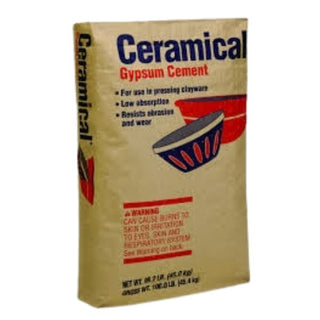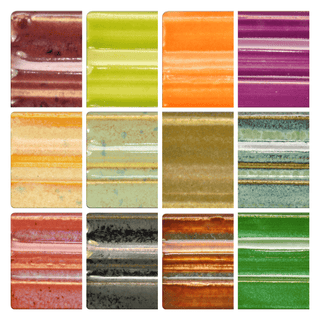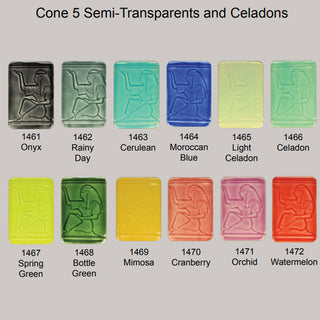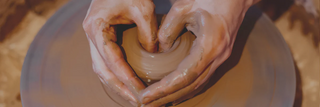U.S. Gypsum CERAMICAL® Gypsum Cement - REGULAR BAGS 50lb Bag
CERAMICAL is a low-consistency form of HYDROCAL Gypsum cement compounded to produce a dense, smooth wearing die material for pressing clayware. Characterized by low absorption, high strength, ability to purge easily, and resistance to abrasion and wear. This USG pottery plaster is specifically for use with the RAM automatic clay-forming process. Available in regular and export bags.
- For use in pressing clayware.
- Low absorption, high strength.
- The USG pottery plaster resists abrasion and wear.
- Specifically for use with the RAM® automatic clay-forming process.
Technical Properties* English Metric
Use Consistency (parts of water by weight per 100 parts plaster ) 40 40
1 Hr. Compressive Strength 3,000 psi 20.6 MPa
Dry Compressive Strength 6,000 psi 40.9 MPa
1 Hr. Modulus of Rupture 825 psi 5.7 MPa
Dry Modulus of Rupture 955 psi 6.6 MPa
Maximum Setting Expansion (%) .13% .13%
Density Wet 115.1 lb/ft3 1.84 g/cc
Dry 96.5 lb/ft3 1.55 g/cc
Set Time (Machine Mix) 18-23 min. 18-23 min.
General Directions and Guidelines
Prepare the USG Pottery Plaster Mix at temperatures between 70° and 100° F (21° and 38° C). Since variations in slurry (the plaster and water mixture) temperature produce variations in setting time, it is important to keep both the plaster and water in a stable temperature environment prior to use. The higher the temperature of the water, the shorter the set time. Weigh both the CERAMICAL® and water for each mix. With CERAMICAL, the best results are obtained for standard RAM working dies
when a 40-consistency mixture is used (40 parts water to 100 parts CERAMICAL by weight). Less water will increase the strength and hardness of the working die, but will decrease permeability. More water with this USG pottery plaster will yield a weaker and more permeable die or mold.
Soaking Sift or strew the plaster into water slowly and evenly. Do not drop handfuls of plaster directly into the water. Allow to soak undisturbed for 2-5 minutes. The USG pottery plaster should be fully dispersed in the water prior to mixing. Small batches require less
soaking than large batches.
Mixing Mixing the plaster slurry is one of the most important steps in producing plaster molds with maximum strength, absorption, hardness, and other important properties.
The CERAMICAL and water should be mixed mechanically with a high-speed (1750 rpm) propeller-type mixer for about
10 minutes. The slurry should be poured within two or three minutes after mixing.
Pouring To prevent air entrainment and provide a uniform, smooth surface, careful pouring of the plaster slurry is necessary. Agitation of the filled case mold is a further step used to prevent air at or near the mold surface. Whenever possible, the USG pottery plaster slurry should be poured carefully in the deepest area so the slurry flows across the surface of the case mold.
Pouring a large amount of slurry directly on the face of the case mold may result in slight densification of the plaster
mold at the point where it strikes the surface of the case. This produces a hard spot, giving uneven absorption.
Purging CERAMICAL hardens and heats rapidly after the initial set. The purging operation should be started at a 23° F (-5° C)
temperature rise over the starting temperature. For complete details on this patented process, contact RAM, Inc.,
1091 Stimmel Rd., Columbus, OH 43223, (614) 443-4634.
Storage Keep in a dry, stable environment indoors. Do not stack more than 2 pallets high. Keep from drafts. Rotate stock.
Shelf life = 90 days.
CUSTOMER REVIEWS - Q&A
Got a question about this product? Ask it here and get a response from our staff and also input from the Sheffield Pottery community!











